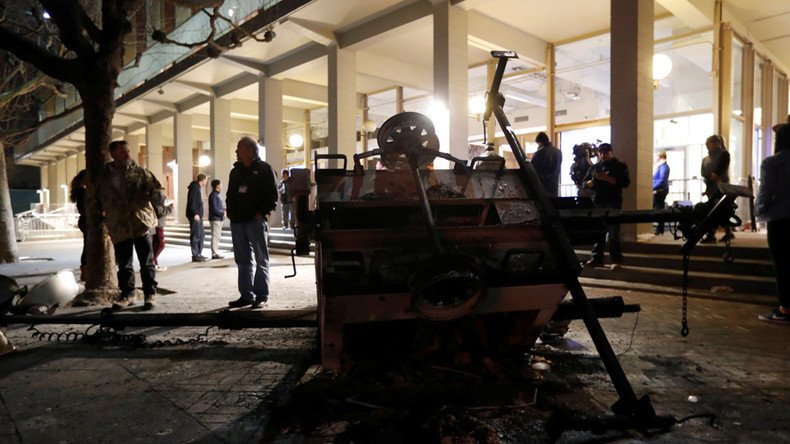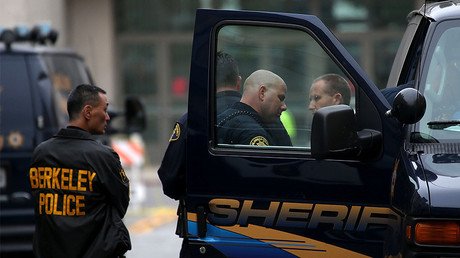Man is separated from beasts by his cognitive ability to entertain and express ideas, but an increasing number of people, including many from the world of academia, would rather man act like an animal than risk offending the sensibilities of his peers.
When speaking about the present atmosphere at American universities, it would be no stretch to say – with a nod to Ray Bradbury’s 1962 novel of the same name – that “something wicked this way comes.” Whether that something “wicked” is the unspeakable F-word known as fascism, I will leave to the reader to judge.
After serving as the illuminating torch that guided the Western world out of the intellectual abyss of the Dark Ages, followed by the Free Speech Movement many centuries later, universities today seem to have come full circle and are right back at the gates of Dante’s damned Inferno.
The descent into insanity began in February when the Left experienced a full-blown anxiety attack as right-wing pundit Milo Yiannopoulos, known for his acerbic fulminations against feminism, political correctness, and multiculturalism, among other sacrosanct Leftist pillars, was scheduled to give a speech at the University of California, Berkeley. Yes, the young articulate man would postulate thoughts and ideas before a crowd of living, breathing people. What is the world coming to?
On the evening of the much-anticipated speech by Mr. Yiannopoulos, who had been invited to Berkeley by a conservative student group, the Leftists behaved no better than spoiled brats, turning their rage against their own campus in protest, burning property and smashing windows.
Meanwhile, it seemed that the worst agitators among the protesters were not students from Berkeley, but rather members of an extreme Leftist group known as Refuse Fascism, whose members wore masks as they wreaked havoc.
Yvette Felarca, the leader of another organization participating in the anti-Milo protest called By Any Means Necessary, or BAMN, told TV station KTVU that she has “no regrets” about the violence and destruction of school property that occurred on the Berkeley campus, describing the eccentric British homosexual commentator (Yiannopoulos’s nationwide trip was dubbed ‘The Dangerous Faggot Tour’) as if he were the very reincarnation of Hitler himself.
“Well, first of all, Milo Yiannopoulos is a fascist,” Felarca declared confidently. “He’s a white supremacist. He’s funded by Steve Bannon and Breitbart. He’s an accolade of Donald Trump. And he was on the UC Berkeley campus to try to recruit more fascists and to wage attacks on Muslim students, immigrant students, women and trans students,” she said.
If nothing else, Felarca’s diatribe illustrates how people whose brittle arguments dissolve into dust from merely a sneeze are forced to toss around empty epithets like “fascist” and “white supremacist” – ad hominem thrusts that give us no indication as to what really disturbs feisty Felarca about Yiannopoulos’s views.
All things considered, it would seem more reasonable to conclude that Felarca, and others who ride front seat in the ‘social justice’ bandwagon, are behaving like the real “fascists,” since they are physically denying individuals their First Amendment right to free speech. Smashing windows and setting fires on the Berkeley campus because some people may disagree with the views of a guest speaker is, at the very least, tantamount to a childish temper tantrum that has no place on a university campus. At its worst, it is in the same league as the book-burning campaigns popular under the Nazis. After all, both acts had one objective in mind: silencing ideas that some may find to be disagreeable. Behavior like that is far worse than anything that could come out of the mouth of Milo.
We may have forgotten in our liberal pursuit of happiness that institutions of higher learning, our hallowed universities, were designed specifically to serve as venues where individuals could assemble peacefully for intelligent debate. Human nature being what it is, however, people can be expected to disagree with each other on many issues. Like it or not, that is simply the nature of the university beast, and no amount of civil disobedience can change that. Until now.
Regrettably and disturbingly, the silencing of Milo Yiannopoulos was not a one-off event. Late last month, Ann Coulter, the controversial conservative pundit and popular author, was also forced to cancel her speaking engagement at Berkeley.
University officials said the Berkeley College Republicans and Young America’s Foundation, who had invited Coulter, “failed to follow proper procedure.” In other words, they fell victim to a bureaucratic booby trap – the least difficult of traps to employ. They also expressed concern about security at the venue. In other words, anytime a controversial figure comes along and threatens to disrupt the bucolic tranquility of Berkeley’s campus, the excuse of “security concerns” will be used as a convenient conversation stopper.
In more ways than one, the violent protests designed to silence Mr. Yiannopoulos and Ms. Coulter would have been a worrying harbinger of things to come. The fact that the protest occurred at Berkeley suggests the disaster is already smoldering in our laps. After all, we are talking about no ordinary university. UC Berkeley is the home of the Free Speech Movement, which, aside from demanding the right of students to organize on-campus political activities, provided the first spark to the anti-war protests of the Vietnam era.
It is unlikely that anybody will hear anything on American campuses these days that remotely echo a 1964 speech given by Berkeley student and FSM organizer Mario Savio, who famously told a campus rally: “There’s a time when the operation of the machine becomes so odious – makes you so sick at heart – that you can’t take part. You can’t even passively take part. And you’ve got to put your bodies upon the gears and upon the wheels, upon the levers, upon all the apparatus, and you’ve got to make it stop. And you’ve got to indicate to the people who run it, to the people who own it, that unless you’re free, the machine will be prevented from working at all.”
How did we arrive at this dangerous juncture in American intellectual history? There is a temptation to blame this regression on the Obama-era “snowflakes” coming of age inside a vacuum of Liberal cultural experimentation that included the legalization of marijuana, same-sex marriage, and transgender bathroom laws, which granted hirsute males loaded with testosterone who suddenly “identified as women” the right to legally help themselves to the ladies’ toilet and locker rooms. No questions asked, and, of course, no sense of impending disaster there.
For eight long years, Liberals were spoon-fed a wonder-pill that put a voice in their heads that said a responsible citizen is one who blissfully chases his or her myriad hedonistic impulses willy-nilly, and to hell with what the government may be doing at home or abroad in their name. Kennedy’s famous maxim, “Ask not what your country can do for you, ask what you can do for your country,” was flipped like a magic trick, and suddenly the millions of whims of millions of individualistic citizens became the primary obsession, as opposed to the health and wellbeing of the body politic.
In his ambitious work entitled From Plato to NATO, David Gress attempted to pinpoint the moment when Liberal thinking went off the rails and became something strange and foreign. According to Gress, “Both Lyndon Johnson’s fall from grace with cultural liberals and the schism within American liberalism between the centrist (meritocratic, assimilationist, tolerant) and the radical (multiculturalist, whiteguilt-ridden, ideological) wings became overt and, arguably, irreversible in 1965.”
Whatever the case may be, university students should be expecting a lot more for their money, especially since they are deeper in tuition debt than ever before. The latest quarterly estimate as of March 31 showed US consumers owed $1.44 trillion in student loans, an increase of $32 billion for the quarter and $80 billion for the year.
All things considered, that seems to be a far greater concern for students than what two controversial conservative pundits may have to say.
In closing, it is important to acknowledge there are positive signs that free speech will emerge victorious, despite these recent setbacks. Many US universities that hosted Milos Yiannopoulos did not self-implode in violence and self-righteousness, but rather allowed the right-wing provocateur to address his audience, as was his Constitutional right. The University of Minnesota, for example, voted in favor of a motion stating that a public university must be “absolutely committed to protecting free speech, both for constitutional and academic reasons,” while noting that “free speech includes protection for speech that some find offensive, uncivil, or even hateful.”
While it is true that the state of California is often the trendsetter when it comes to social and cultural issues, hopefully this time that rule will be the exception.
The statements, views and opinions expressed in this column are solely those of the author and do not necessarily represent those of RT.



